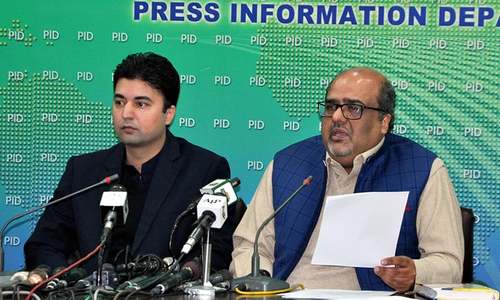ISLAMABAD: The National Assembly’s Standing Committee on Law and Justice is set to take up a number of key bills, including the National Accountability (Second Amendment) Ordinance, 2019, in its two-day meeting starting on Monday (today).
Besides the NAB ordinance, the committee headed by ruling Pakistan Tehreek-i-Insaf (PTI) MNA Riaz Fatyana will also review four constitutional amendment bills, including the one moved by Pakistan Peoples Party (PPP) MNA Abdul Qadir Patel seeking to limit the powers of the president to promulgate ordinances, shows the agenda of the meeting issued by the National Assembly Secretariat.
The committee will also take up a crucial constitution amendment bill moved by Kesoo Mal Kheeal Das seeking to declare Punjabi, Sindhi, Pashto, Balochi, Brahvi, Hindko and Seraiki as “national languages” of Pakistan along with Urdu.
Such bills seeking national language status for the regional languages have been introduced by legislators several times in the past, but they could not sail through parliament.
The NAB ordinance curtailing certain key powers of the accountability watchdog is on the agenda of the committee’s meeting despite the fact that the government and the opposition are still busy in open as well as backdoor negotiations on it.
Bill seeking to limit govt’s powers to issue ordinances also on agenda
The ordinance has actually been introduced to take care of the business community and to allay their fear about NAB actions, but, to some extent, it proved beneficial for politicians and bureaucrats as well, as it has redefined the terms “misuse of authority” and “acts done in good faith”.
An amendment made through the ordinance in Section 9 (a)(vi) of the National Accountability Ordinance of 1999 says: “Nothing shall be construed as misuse of authority by a holder of public office unless there is corroborative evidence of accumulation of any monetary benefit or asset which is disproportionate to his known sources of income or which cannot be reasonably accounted for.”
A new clause in the same section reads: “An act done in good faith and in discharge of duties and performance of official function shall not, unless there is corroborative evidence of accumulation of any monetary benefit or asset which is disproportionate to the known sources of income or which cannot be reasonably accounted for, constitute an offence under this clause.”
Another amendment reads: “Notwithstanding anything contained in this Ordinance or any other law for the time being in force, the valuation of immovable properties, for the purposes of assessing as to whether a holder of public office has assets disproportionate to his known sources of income, shall be reckoned either according to the applicable rate prescribed by the district collector or the Federal Board of Revenue, whichever is higher. No evidence contrary to the latter shall be admissible.”
Initially, the Pakistan Muslim League-Nawaz and the PPP rejected the NAB ordinance, alleging that “the government is making efforts to protect a few of its cronies and dry-clean the PTI”, but later they extended their covert support to the move after finding it beneficial for themselves as well. More than 100 accused of NAB have already applied before various courts to seek relief under the law and PPP leader and former prime minister Raja Pervez Ashraf is among those who have benefitted from it.
At the time of the passage of the services chiefs’ extension bills last month, both the government and the opposition had reached an understanding and agreed to cooperate with each other during legislation on key public issues.
When contacted, PPP parliamentarian Syed Naveed Qamar confirmed that his party was not opposed to the basic spirit behind the ordinance. However, he said, the opposition considered further improvement in the law and it would suggest amendments when it would come before the committee.
Talking to Dawn, chairman of the law and justice committee Riaz Fatyana said the bill was on the agenda for Monday’s meeting, but since there had been no agreement so far between the government and the opposition, the committee might defer it till Tuesday (tomorrow) to allow the two sides more time for consultation.
He expressed the hope that the government and the opposition would soon succeed in developing a consensus on the issue.
Sources said the government and the opposition were engaged in some “backdoor talks” to reach consensus. They said Law Minister Farogh Naseem and PPP Senator Farooq Naek were also in contact with each other on the issue.
Meanwhile, the NA committee is also scheduled to take up a constitution amendment bill of PPP’s Abdul Qadir Patel suggesting changes in Article 89(1) of the Constitution, seeking to limit the number of ordinances.
The statement of objects and reasons attached to the bill says: “The basic function of the parliament is to legislate. But during the course of recent months, it has been observed that the role of the parliament is being restricted and the legislation is being done through promulgation of ordinances.
“Ordinances are issued simultaneously in dozens. Therefore, it is necessary to limit the number of ordinances issued simultaneously so that the parliament may proceed in a much better manner.”
The present government has already promulgated 27 ordinances since assuming power in August 2018.
Published in Dawn, February 24th, 2020















































